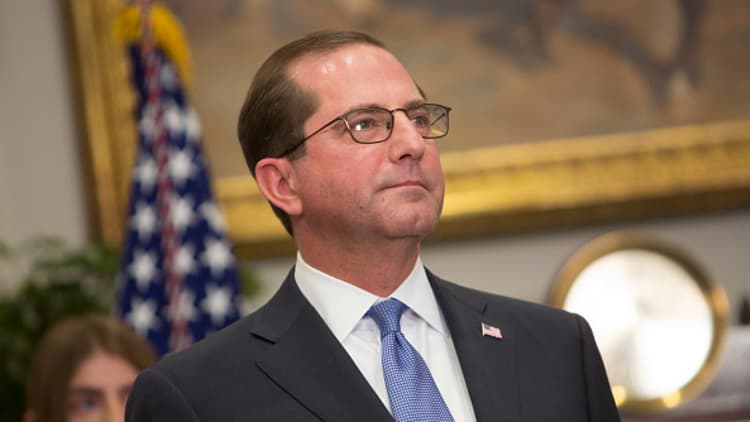
The pharmaceutical industry's friendly relationship with the Trump administration since it introduced its blueprint to lower drug prices in May is now starting to show signs of strain. And it's all about TV drug ads.
Major drugmakers pledged Monday they will soon include price information in television advertisements, conceding to a proposal from the Trump administration, but not going as far as the administration hoped. Health and Human Services Secretary Alex Azar fired back in a speech later Monday, saying the industry proposal doesn't do enough.
The HHS is proposing to require that drug companies include the list price of medicines paid for by Medicare or Medicaid when they're advertised on television, Azar told a meeting of the National Academic of Medicine Monday.
The announcement came hours after the Pharmaceutical Research and Manufacturers of America (PhRMA) trade group pledged to start telling consumers in TV ads where they can go to find information about costs, beginning April 15, 2019. They're expected to direct consumers to websites with information about list price, as well as estimates for how much they are likely to pay with insurance. It's unclear how explicit this information will be. Pharmaceutical ads are already flooded with caveats about side effects.
"We appreciate their effort," Azar said Monday with a hint of sarcasm. "But placing information on a website is not the same as putting it in an ad. It has taken them five months since the blueprint to start skating where the puck is going."
PhRMA opposes this idea because it says advertising only the list price can mislead consumers and possibly dissuade them from taking potentially life-saving medicines. A drug's list price is usually the starting point from which pharmacy benefit managers and insurers neogtiate. Few patients pay this price.
"We think our approach — providing list price in context — is what patients want and need so they can take action upon information," PhRMA President Stephen Ubl said Monday on a call with reporters. "So we think our approach is the better way."
Azar, a former top executive at drug giant Eli Lilly, disputed the industry's frequent argument that drugs' list prices are meaningless. They matter to seniors covered by Medicare who have to pay co-insurance based on drugs' list price, and to patients with high-deductible health plans that require patients pay a large proportion of costs before insurance kicks in, he said.
"List prices matter to patients," said Azar.
The dispute is the latest battle in an increasingly hostile and public war between drugmakers and lawmakers. A number of pharmaceutical companies pledged to temporarily halt price increases this summer after Trump chastised the industry broadly and Pfizer CEO Ian Read specifically on Twitter.But Read subsequently praised Trump and his blueprint, saying it would be good for both patients and the drug industry.
From the Trump administration's perspective, forcing companies to include prices in advertisements may convince drugmakers to lower their prices. Some are skeptical this would work since how much patients actually pays can vary widely.
PhRMA's 33 members include names like Pfizer, Johnson & Johnson, Eli Lilly and other major biopharma companies. The group argues forcing companies to include list price in television advertisements is unconstitutional because it infringes on their First Amendment rights.
PhRMA officials told reporters they're not currently planning a lawsuit but they do not think there's any rule that can legally be issued.


